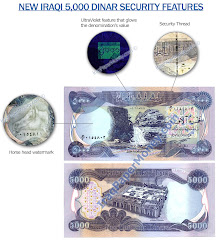Iraq Plans To Rebase Its Dinar Early 2008 - Fin Min
Thu, Nov 29 2007, 15:19 GMThttp://www.djnewswires.com/eu
Thu, Nov 29 2007, 15:19 GMThttp://www.djnewswires.com/eu
UPDATE: Iraq Plans To Rebase Its Dinar Early 2008 - Fin Min (adds more interview details) By Hassan Hafidh Of DOW JONES NEWSWIRES AMMAN (Dow Jones)-The Central Bank of Iraq is contemplating rebasing the Iraqi dinar and issuing new banknotes early next year, the country's Finance Minister said Thursday.
"The Central Bank will take a decision in three months time from now, taking off three zeros from the current Iraqi dinar value," Bayan Jabor said in an exclusive interview with Dow Jones Newswires in Amman.
On Thursday, the dinar traded 1,230 dinars against the dollar, according to a trader in Baghdad. If the rebase decision is taken, it means that a dollar will equal only 1.23 dinars at current prices, the minister said.
Currency rebasings usually are monetarily neutral and are introduced to make commercial calculations easier. Turkey knocked six zeroes off its lira currency on Jan 1 2005, for example.
Before the U.S.led invasion of 2003, the dinar was trading at 2,500 against the.During early 1980s an Iraqi dinar was traded by Iraqi state-run banks at 3 dollars.
The Central Bank of Iraq has been working to improve the value of the dinar against the dollar through holding a daily auction to sell dollars to private and government banks. The bank sells between $35 and $50 million in each auction it holds, bank officials said.
The Iraqi minister said, however, printing new bank notes and fully replacing old notes would take two years.
In July 2004, the now dissolved U.S. civilian authority in Iraq decided to print the current Iraqi bank notes replacing those used to bear the picture of the former Iraqi leader Saddam Hussein। Iraqis then had three months to swap their old dinars with the new ones।
According to Central Bank officials some 10,000 tons of old dinars were then collected and burned.
The current banknotes were printed by Britain's De La Rue Plc (DLARL), the world's biggest commercial printer of bank notes.
Jabor didn't say which company would print the new banknotes. Jabor said that the government was able to bring down inflation from a record figure of 60% last year to a current 16%.
He said Iraq's economy is growing at a rate of 6% this year and that the government wants to increase that figure with more crude oil exports, tourism and agriculture in 2008। Iraq sits on the third largest oil reserves in the world and depends on oil sales for almost all of its foreign currency earnings. Jabor announced earlier this month that the country's budget for 2008 would be $48।4 billion up from $42 billion in 2007. Some 88% percent of that budget would be financed from oil revenues which are expected to reach $36 billion, according to Iraqi officials.
He said that his ministry has allocated $15.5 billion for investment in various industrial, oil, agricultural, housing and service projects in 2008. He said some $5 billion that the government was not able to spend in 2007 would be moved to 2008 investment plan.
While in Amman, Jabor met with Jordanian businessmen to encourage them to start investment in Iraq's ambitious reconstruction plan for 2008. He did the same thing with Syrian and Kuwaiti businessmen last week.
By Hassan Hafidh; Dow Jones Newswires; + 962 777 612 111; hassan।hafidh@dowjones.com (END) Dow Jones NewswiresNovember 29, 2007 10:19 ET (15:19 GMT)Copyright 2007 Dow Jones & Company, Inc।






Tidak ada komentar:
Posting Komentar